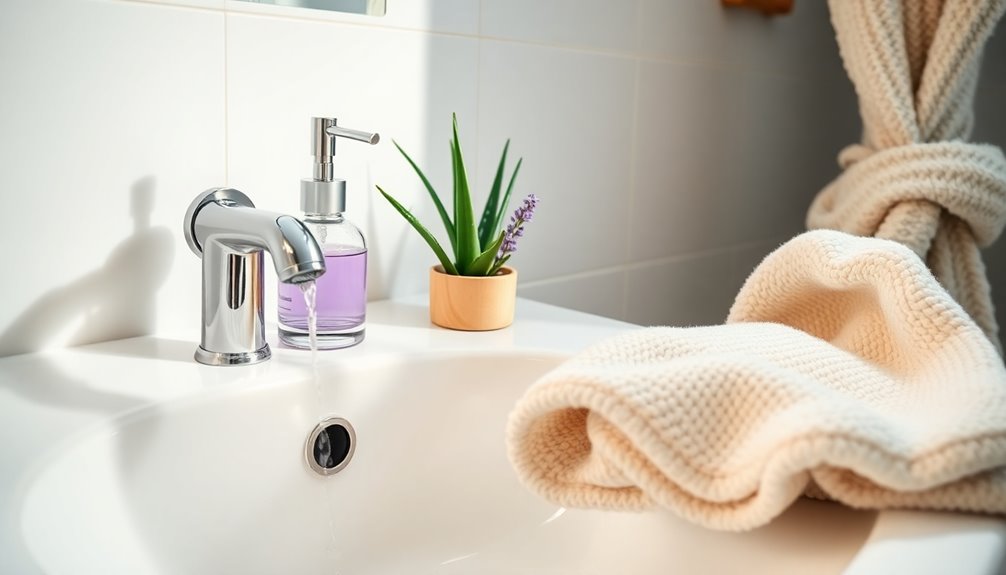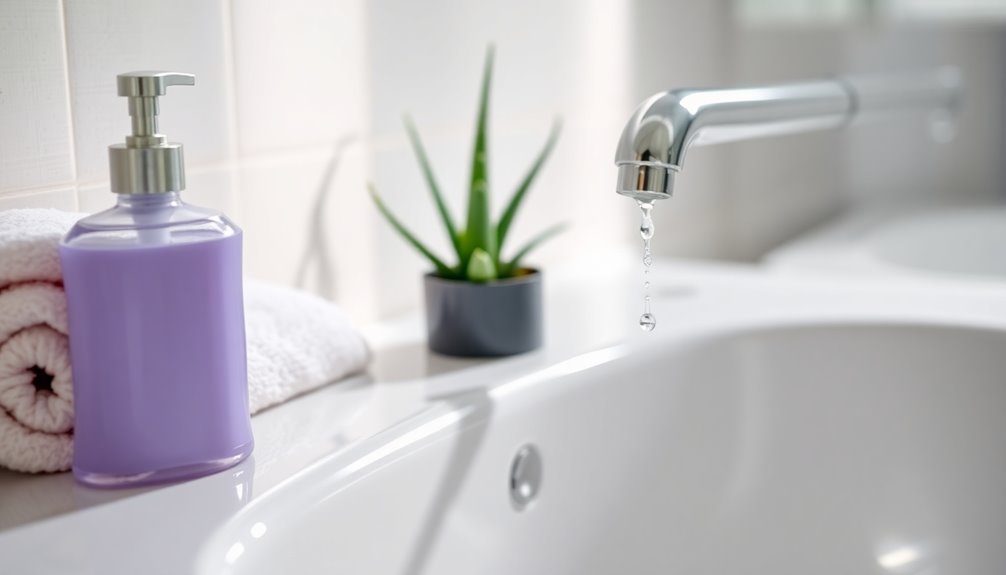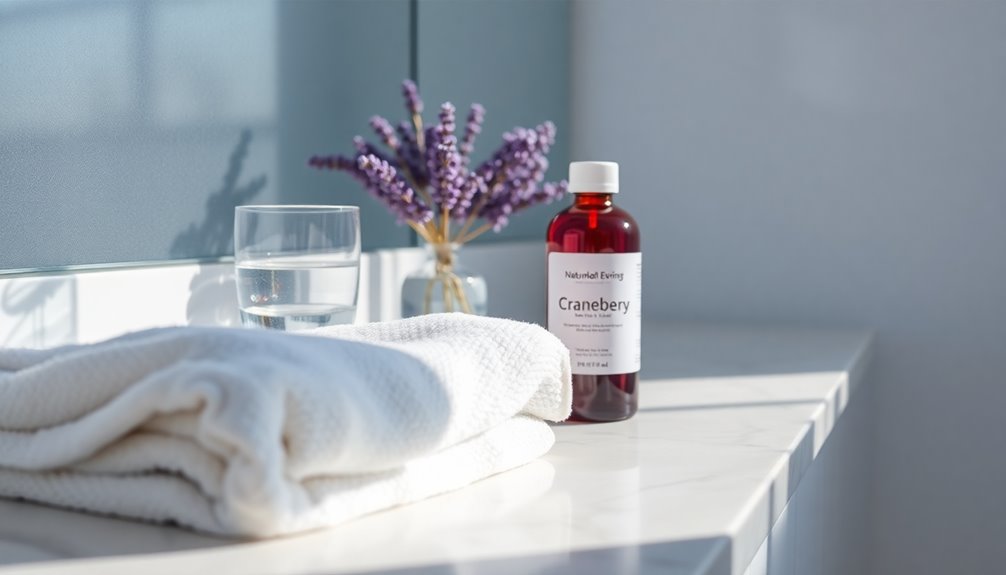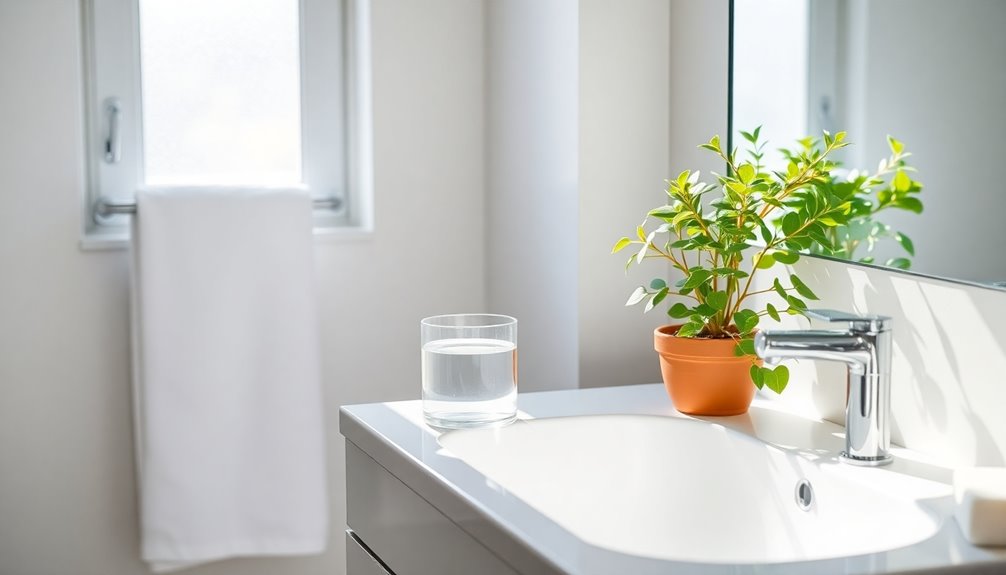To prevent a UTI after sex, focus on hygiene and hydration. Always wash your genital area before and after intimacy, and make sure to urinate right after sex to flush out bacteria. Drink plenty of water, aiming for at least eight glasses a day, and consider adding cranberry juice for extra protection. Opt for breathable cotton underwear and avoid tight clothing to keep the area dry. If you find yourself getting frequent UTIs, consult your healthcare provider for tailored advice and potential preventive options. These strategies can considerably enhance your urinary health and comfort.
Key Takeaways
- Maintain good hygiene by showering and washing the genital area before and after sexual activity.
- Urinate immediately after sex to help flush out any introduced bacteria.
- Use water-based lubricants to reduce friction and irritation during intercourse.
- Stay well-hydrated by drinking plenty of water, especially after sexual activity.
- Avoid spermicide and diaphragms, which can disrupt the natural balance of vaginal bacteria.
Understanding UTIs and Risk Factors

Understanding UTIs and their risk factors is essential, especially if you're sexually active.
UTIs occur when harmful bacteria from your skin or rectum enter the urinary tract, which includes the urethra, bladder, and kidneys. Women are particularly vulnerable due to their shorter urethra, making it easier for bacteria to reach the bladder.
Engaging in sexual activity can also introduce these bacteria, increasing your risk of infection, especially with new partners. Certain contraceptive methods, like diaphragms and spermicides, can disrupt the balance of protective bacteria, further raising your risk.
If you've had recurrent UTIs or have structural issues in the urinary tract, such as an enlarged prostate, your chances of developing a UTI are also heightened.
Stay informed to better protect yourself.
Importance of Hygiene Practices

When it comes to preventing UTIs, hygiene practices before and after sex are key.
By maintaining cleanliness and being mindful of how you care for your body, you can greatly lower your risk of infections.
Let's explore the essential steps for pre- and post-sex hygiene, along with general practices you should adopt.
Pre-Sexual Activity Hygiene
Good hygiene practices before sexual activity can greatly lower your risk of developing a urinary tract infection (UTI).
Start by showering and washing your genital area with mild soap to reduce harmful bacteria. Remember to wipe from front to back after using the restroom; this minimizes transferring bacteria from the rectal area to the urethra, essential for urinary tract health.
Both you and your partner should maintain good hygiene by washing hands and genitals before intimacy.
Consider using water-based lubricants during sex to prevent friction and irritation, which can lead to bacterial entry.
Also, avoid scented products in the genital area to maintain healthy bacteria and further decrease UTI susceptibility.
Prioritizing these practices can markedly help prevent UTIs.
Post-Sexual Activity Hygiene
Post-sexual activity hygiene plays a crucial role in preventing urinary tract infections (UTIs). After sexual intercourse, following specific hygiene practices can help prevent bacteria from causing an infection.
Here are some key steps to bear in mind:
- Urinate immediately after sex to flush out any introduced bacteria.
- Clean your genital area with mild soap and water before and after intercourse.
- Wipe front to back after using the restroom to avoid spreading bacteria.
- Showering after sex can greatly reduce bacterial transfer to the urinary tract.
- Avoid scented products and douching to maintain the natural balance of vaginal flora.
General Hygiene Practices
Maintaining effective hygiene practices is vital for preventing urinary tract infections (UTIs) after sexual activity. Start by urinating before and after sex to help flush out bacteria that may enter the urinary tract during intercourse.
Cleaning the genital area thoroughly with mild soap and water minimizes harmful bacteria, while wiping from front to back after using the restroom prevents the spread of bacteria from the anal region to the urethra. This practice is especially important for individuals assigned female at birth (AFAB).
Avoid scented products in the genital area, as they can irritate the urethra and disrupt good bacteria.
Finally, make sure both partners maintain good hygiene practices to greatly lower the risk of introducing bacteria that cause UTIs.
Hydration and Fluid Intake

Staying hydrated is key to preventing UTIs, so aim for at least 8 glasses of water each day.
After sex, increasing your fluid intake can help flush out bacteria and keep your bladder healthy.
Consider adding cranberry juice or supplements to your routine for extra protection against harmful bacteria. Additionally, consuming freshly squeezed juice may provide additional vitamins that support your immune system.
Daily Water Intake
Drinking at least 8 glasses of water a day is essential for preventing urinary tract infections (UTIs), especially after sex.
Adequate daily water intake helps dilute urine and flush out bacteria from the urinary tract, reducing the risk of infection. Proper hydration promotes overall urinary health and supports healthy bladder function.
Here are some tips to guarantee you stay hydrated:
- Keep a water bottle handy throughout the day.
- Drink an extra glass of water after sexual activity.
- Track your daily fluid intake using an app or journal.
- Choose water-rich foods like fruits and vegetables.
- Set reminders to drink water regularly.
Cranberry Supplement Benefits
Hydration plays a vital role in preventing urinary tract infections (UTIs), and incorporating cranberry supplements into your routine can enhance these efforts.
These supplements are rich in proanthocyanidins, which help inhibit bacterial growth by preventing bacteria from adhering to the urinary tract walls. While cranberry juice offers some benefits, concentrated cranberry supplements are often more effective, providing fewer sugars that could irritate your bladder.
Research shows that consistent cranberry supplementation may reduce recurrence of UTIs by nearly 25% in those prone to infections. Additionally, cranberry juice is rich in antioxidants, which can further support overall health and immune function.
Remember to maintain adequate water intake alongside these supplements to dilute urine, further decreasing the risk of bacterial growth.
Always consult your healthcare provider before starting any new supplement, especially if you have existing health conditions or take medications.
Hydration Timing Strategies
While you mightn't think about it, the timing of your fluid intake can greatly impact your urinary health, especially after sexual activity. Staying properly hydrated is key to flushing out bacteria that may enter your urinary tract during intercourse.
Here are some strategies to take into account:
- Drink at least 8 glasses (about 2 liters) of water daily.
- Have an extra glass of water immediately after sex.
- Monitor your fluid intake around times of sexual activity.
- Incorporate cranberry juice or supplements for added protection.
- Confirm your urine remains clear and pale yellow, indicating proper hydration.
These hydration timing strategies can greatly reduce your risk of developing a UTI and support overall urinary tract health.
Sexual Practices to Consider

To reduce the risk of urinary tract infections (UTIs) after sex, consider adopting specific sexual practices that can help protect your urinary health.
First, make it a habit to urinate immediately after sexual activity; this can flush out bacteria that might've entered the urethra.
Using water-based lubricants can also help minimize friction and irritation, decreasing the chances of bacterial entry.
Maintaining good genital hygiene by thoroughly cleaning the area before and after sex is essential for preventing bacteria transfer.
Engaging in monogamous relationships lowers the risk, as multiple partners increase exposure to different bacteria.
Finally, avoid spermicides and diaphragms, which can disrupt vaginal flora and potentially introduce harmful bacteria, further elevating UTI risk.
Clothing Choices for Prevention

Choosing the right clothing can greatly impact your urinary health, especially when it comes to preventing UTIs. Opting for breathable materials helps keep the genital area dry and reduces moisture accumulation, which can decrease bacterial growth.
Consider these clothing choices:
- Wear cotton underwear for breathability.
- Avoid tight-fitting clothing that restricts air circulation.
- Choose moisture-wicking fabrics during exercise to stay dry.
- Change out of wet swimsuits or workout clothes promptly to prevent moisture exposure.
- Opt for loose-fitting pants instead of tight jeans to enhance airflow.
Medical Advice and Prophylactic Measures

Seeking medical advice is essential if you're prone to urinary tract infections (UTIs), as a healthcare provider can offer tailored recommendations and preventative measures. They might prescribe personalized prophylactic antibiotics, especially if you've had two or more UTIs in six months. For postmenopausal women, discussing estrogen therapy can help maintain urinary health and reduce infection risk. Regular check-ups enable monitoring urinary health and addressing underlying conditions.
| Recommendation | Purpose | Notes |
|---|---|---|
| Prophylactic antibiotics | Reduce UTI frequency | Discuss with your provider |
| Estrogen therapy | Maintain urinary tract health | Especially for postmenopausal women |
| Regular check-ups | Monitor urinary health | Identify underlying issues |
| Lifestyle modifications | Complement medical interventions | Tailored to individual needs |
| Post-activity hygiene tips | Prevent post-sex UTIs | Essential for all sexually active individuals |
Lifestyle Changes for Urinary Health

In addition to medical advice and prophylactic measures, making specific lifestyle changes can greatly enhance urinary health and reduce the risk of UTIs.
Here are some effective strategies you can adopt:
- Drink at least 8 glasses of water daily to dilute urine and flush out bacteria.
- Practice good hygiene by urinating before and after sexual activity to minimize bacterial entry.
- Wear breathable cotton underwear and avoid tight-fitting clothing to keep the area dry.
- Shower before and after sex to reduce bacteria transfer from the skin to the urinary tract.
- Regularly empty your bladder and avoid holding urine for extended periods to prevent bacterial growth.
Implementing these lifestyle changes can considerably help prevent urinary tract infections (UTIs) and promote overall bladder health.
Frequently Asked Questions
Why Do I Get UTIS so Easily After Sex?
You might get UTIs easily after sex due to several factors.
Your shorter urethra allows bacteria to enter your bladder more easily during intercourse.
If you have new sexual partners, they may introduce unfamiliar bacteria that your body isn't used to handling.
Also, if you don't urinate before or after sex, bacteria can linger near your urethra, increasing your risk of an infection.
Certain contraceptives can also upset your natural bacterial balance, contributing to the issue.
Why Does My Bf Keep Giving Me UTIS?
If your boyfriend keeps giving you UTIs, it might be due to a few factors.
His hygiene could be a concern; if he doesn't clean properly before intimacy, bacteria can easily transfer to you.
Additionally, new sexual practices or frequent activity can introduce unfamiliar bacteria.
It's crucial to communicate about hygiene and consider changes in your sexual routine to reduce the risk of infections.
Don't hesitate to consult a healthcare professional for further guidance.
How Do You Stop a UTI When You Feel It Coming?
When you feel a UTI coming on, increase your fluid intake to help flush out bacteria.
Drinking plenty of water can dilute your urine and make it easier to pass. Consider cranberry juice or supplements, as they might help, although their effectiveness isn't guaranteed.
Urinate frequently to eliminate bacteria, and over-the-counter pain relievers can ease discomfort.
If symptoms persist or get worse, don't hesitate to consult a healthcare provider for appropriate treatment.
Does Taking a Shower After Sex Prevent UTI?
You might think showering after sex is unnecessary, but it can actually help.
Taking a quick shower rinses away bacteria that could find their way into your urinary tract. By washing with mild soap, you maintain cleanliness without disrupting your body's natural balance.
Plus, the simple act of showering can make you feel refreshed.
Conclusion
In the journey to keep pesky UTIs at bay, remember that a little care goes a long way. By embracing good hygiene, staying hydrated, and being mindful of your choices, you can enjoy intimacy without worry. Opt for breathable clothing and consider friendly chats with your healthcare provider for personalized tips. With these simple adjustments, you'll be well on your way to a healthier urinary track, allowing you to focus on what truly matters—your comfort and connection.










